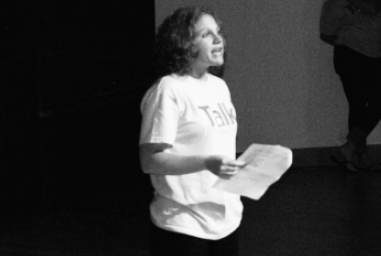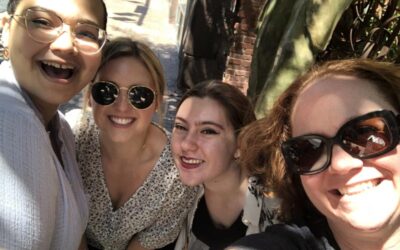Click here to view the FOCUS Article as a PDF
From FOCUS – a publication of the faculty and staff of Carnegie Mellon University.
Volume 21, No. 8, Spring 2010
09-10 Focus Management Committee: John Mackey, 09-10 Faculty Senate Chair, Mathematical Sci. Denise Novak, University Libraries, Terry Hurlbert, University Libraries
There’s no hidden secret to Samantha Bushman’s idea for effective sex education – it’s plastered in large type across the letterhead for her new nonprofit organization: “Talk: The New Sex Ed.”
Talk. Sounds so simple, doesn’t it? So why does the thought of talking about sex to our children turn every parent’s stomach into knots? Easing parents’ anxiety and paving the way for communication are two key objectives of the parent program Bushman is developing. Her model also includes a teen program, which brings the teens together with a near-age peer who is both old enough to be credible and young enough to connect with the teens.
[bra_blockquote align=”]When it comes to talking about sex and sexuality,” she said, “many parents don’t have a framework for how these conversations are supposed to go because their parents never spoke with them. What to say, how to say it and where to start is often unclear, and the prospect can be overwhelming.[/bra_blockquote]
Bushman says research shows that parents consistently underestimate their ability to influence teens’ decisions regarding sex, even though surveys show that teens say it would be easier to delay sexual activity if they were able to have more open and honest discussions with their parents. “From the outset, I wanted to design a program based on what teens told me they needed. Over and over again, they said their formal sex ed experience was disconnected from the realities of teenage life and they didn’t feel comfortable asking ‘real’ questions.”
The objective for the teen program is to provide a safe space for them to ask those questions. Working with 44 high school students attending CMU’s pre-college program last summer, she said “it was quite striking how much they wanted a safe, comfortable setting to get their questions answered.” The U.S., she said, has the highest rates of teen pregnancy, abortion and sexually transmitted infections in the Western industrialized world. “Right now I feel like we’re not doing a good job in a lot of different areas.”
Her approach uses a collaborative model “that underscores the important role both educators and parents have to play. It shouldn’t be an either-or scenario.” The parent program teaches Moms and Dads how to recognize opportunities to initiate a discussion about sexuality, whether it’s overhearing a comment at the mall or having a TV program abruptly take a racy turn. The key is for parents to be prepared to use those opportunities to convey their own values, without lecturing.
For teens, Bushman intends to partner with community-based organizations to deliver the programming and help the teens move toward relationships that are both emotionally and physically healthy. Bushman, the Institute for Social Innovation’s Post-Graduate Fellow, said early results look very promising. “I’m looking forward to piloting the program in additional settings to understand how to maximize Talk’s impact.”
This spring, she organized “Talk: The New Sex Ed” into a 501(c)3 non-profit and now she is seeking external funding and strategic partnerships to pilot the program in additional settings. With help from a gift to Heinz College from alumna Anne Lewis, she’s already secured $50,000 in seed funding for her work so far and wants to raise another $150,000 by the end of August. That’s where the social entrepreneurship comes in. Denise Rousseau, faculty director of The Institute of Social Innovation, said the institute is helping Bushman develop a business model, programming and training systems. In similar fashion, the institute was instrumental setting an enterprise to reclaim toxic industrial land in communities such as Braddock, using Brassica plants which are turned into biofuel. “We have learned how critical it is to work in parallel with business and program development. The window for social entrepreneurs to launch is small,” said Rousseau.
“It is tough to be in the development phase for long when you have a venture that we know will not make money to pay a living wage in the first few years. So moving deliberately but fast is critical.”
A native of Massapequa, Long Island, Bushman’s interest in sex education evolved from two events within her own social circle — a friend who got pregnant shortly after graduating from high school, and another friend who was sexually assaulted her freshman year of college. According to Department of Justice data, one in four college women are victims of sexual assault.
Meanwhile, the Centers for Disease Control and Prevention reports that one in three American girls become pregnant before the age of 20, and one in four has a sexually transmitted infection. In addition to those disturbing numbers, she said, one in four adolescents report they are verbally, physically, emotionally, orsexually abused by a dating partner each year. Her goal is to give parents the tools to recognize teachable moments. “It doesn’t need to be a show stopper.”
Bushman first came to CMU in 2001, left for about a year after her graduation and worked in Nassau County, then returned to Heinz College where she earned her master’s in public policy and management in 2008.
“I always knew I wanted to start my own nonprofit.” She believes her two-pronged approach addresses two major obstacles to helping teens sort through their questions and feelings about sex – parental discomfort and uncertainty about how to address the topic, and teens’ wanting information.
[bra_blockquote align=”]We live in a sex-saturated culture, but the topic is rarely discussed openly, let alone effectively,[/bra_blockquote] Bushman said. “In the absence of a productive dialogue, messages from the media and pop culture go unquestioned and a vacuum gets filled. “There’s a need for teens to have a place to go where they can talk openly and get answers to their questions.”
There needs to be more choices, she said, and government officials have signaled their willingness to fund new and innovative approaches – in no small part because among the traditional approaches, “even the best programs have had modest effect at best.” She believes Talk’s approach will defuse the abstinence versus comprehensive sex ed debate.[bra_blockquote align=’right’]Rather than focusing on what teens need, the current debate is steeped in ideology. As advocates on both sides struggle to advance their agendas, young people are getting left behind.[/bra_blockquote] “Most Americans support programs that provide teens with information about abstinence AND information about how to prevent unintended pregnancy and STIs,” she said. That’s what she hopes to change. “It’s never too early to open up lines of communication that pave the way for future conversations.”




